Plant-based Fish Market
Plant-based Fish Market Size and Share Forecast Outlook 2025 to 2035
Plant-based fish market is projected to grow from USD 1.3 billion in 2025 to USD 3.4 billion by 2035, at a CAGR of 10.2%. Fillets & Sticks will dominate with a 43.0% market share, while soy/pea blends will lead the protein source segment with a 58.0% share.
Plant-based Fish Market Forecast and Outlook 2025 to 2035
The global plant-based fish market is valued at USD 1.3 billion in 2025. It is slated to reach USD 3.4 billion by 2035, recording an absolute increase of USD 2.1 billion over the forecast period. This translates into a total growth of 161.5%, with the market forecast to expand at a compound annual growth rate (CAGR) of 10.2% between 2025 and 2035. The overall market size is expected to grow by nearly 2.62X during the same period, supported by increasing ocean sustainability concerns, growing flexitarian and pescatarian populations, rising innovation in plant-based seafood technology, and expanding availability through mainstream retail channels.
Quick Stats for Plant-based Fish Market
- Plant-based Fish Market Value (2025): USD 1.3 billion
- Plant-based Fish Market Forecast Value (2035): USD 3.4 billion
- Plant-based Fish Market Forecast CAGR: 10.2%
- Leading Protein Type in Plant-based Fish Market: Soy/Pea Blends
- Key Growth Regions in Plant-based Fish Market: North America, Europe, and Asia-Pacific
- Key Players in Plant-based Fish Market: Good Catch, Impossible Foods, Nestlé Vuna, Quorn, OmniFoods, Gardein
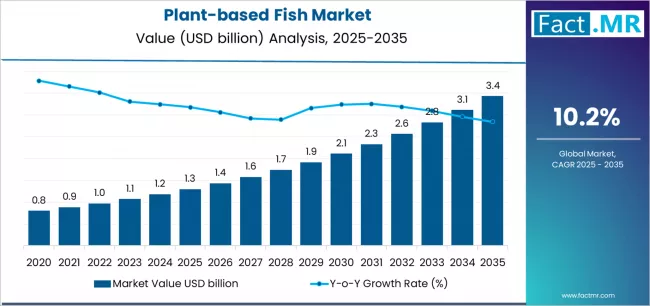
Between 2025 and 2030, the plant-based fish market is projected to expand from USD 1.3 billion to USD 2.1 billion, resulting in a value increase of USD 0.8 billion, which represents 38.1% of the total forecast growth for the decade. This phase of development will be shaped by increasing ocean conservation awareness, growing plant-based diet adoption, and expanding product innovations in taste and texture replication. Alternative protein companies and food manufacturers are expanding their plant-based fish capabilities to address the growing demand for sustainable seafood alternatives.
Plant-based Fish Market Key Takeaways
| Metric | Value |
|---|---|
| Estimated Value in (2025E) | USD 1.3 billion |
| Forecast Value in (2035F) | USD 3.4 billion |
| Forecast CAGR (2025 to 2035) | 10.2% |
From 2030 to 2035, the market is forecast to grow from USD 2.1 billion to USD 3.4 billion, adding another USD 1.3 billion, which constitutes 61.9% of the overall ten-year expansion. This period is expected to be characterized by the expansion of foodservice applications, development of premium and specialty products, and growth of novel protein sources including algae-based formulations. The growing adoption of sustainable consumption practices and marine conservation awareness will drive demand for plant-based fish with enhanced sensory characteristics and nutritional profiles.
Between 2020 and 2025, the plant-based fish market experienced rapid growth, driven by increasing awareness of ocean sustainability challenges and growing recognition of plant-based seafood as an innovative solution that combines environmental responsibility with culinary satisfaction. The market developed as environmentally conscious consumers and innovative food companies recognized the potential for plant-based fish technology to address overfishing concerns, reduce environmental impact, and provide satisfying seafood alternatives while meeting dietary preferences and sustainability objectives.
Why is the Plant-based Fish Market Growing?
Market expansion is being supported by the increasing global awareness of ocean sustainability and overfishing concerns driven by environmental consciousness and marine conservation efforts, alongside the corresponding need for seafood alternatives that can provide familiar taste experiences, nutritional benefits, and culinary versatility without contributing to marine ecosystem depletion across various consumer demographics and dining applications. Modern alternative protein companies and food manufacturers are increasingly focused on implementing plant-based fish solutions that can replicate seafood experiences, support environmental sustainability, and provide convenient protein alternatives while maintaining taste satisfaction and nutritional adequacy.
The growing emphasis on sustainable consumption and environmental responsibility is driving demand for plant-based fish that can support marine conservation, reduce carbon footprint, and ensure comprehensive environmental benefits through plant-based protein sources with minimal ecological impact. Food manufacturers' preference for products that combine environmental benefits with consumer appeal and market differentiation is creating opportunities for innovative plant-based fish implementations. The rising influence of flexitarian diets and conscious consumption is also contributing to increased adoption of plant-based fish that can provide superior sustainability credentials without compromising taste experience or culinary applications.
Segmental Analysis
The market is segmented by product type, protein source, and distribution channel. By product type, the market is divided into fillets & sticks, tuna-style flakes, and shrimp/crab analogs. Based on protein source, the market is categorized into soy/pea blends, wheat/other, and algae/novel proteins. By distribution channel, the market is segmented into retail, foodservice, and online.
By Product Type, the Fillets & Sticks Segment Leads the Market
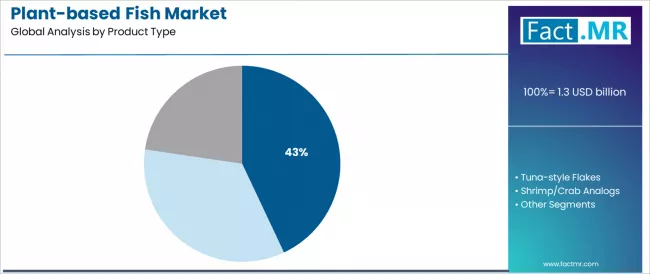
The fillets & sticks segment is projected to maintain its leading position in the plant-based fish market in 2025 with a 43% market share, reaffirming its role as the preferred product format for plant-based seafood consumption due to versatility and familiarity advantages. Food manufacturers and consumers increasingly utilize fillet and stick formats for their cooking convenience, portion control benefits, and proven effectiveness in replicating traditional fish preparation methods while supporting diverse culinary applications and meal planning requirements. Fillet and stick format's proven effectiveness and consumer familiarity directly address market requirements for convenient seafood replacement and cooking versatility across diverse consumption occasions and culinary preferences.
This product segment forms the foundation of plant-based seafood adoption, as it represents the format with the greatest contribution to traditional cooking methods and established consumer acceptance across multiple meal categories and preparation styles. Alternative protein industry investments in fillet and stick technologies continue to strengthen adoption among manufacturers and home cooks. With consumer preferences requiring familiar cooking experiences and versatile applications, fillets and sticks align with both culinary objectives and meal preparation convenience, making them the central component of comprehensive plant-based seafood strategies.
By Protein Source, the Soy/Pea Blends Segment Dominates Market Demand
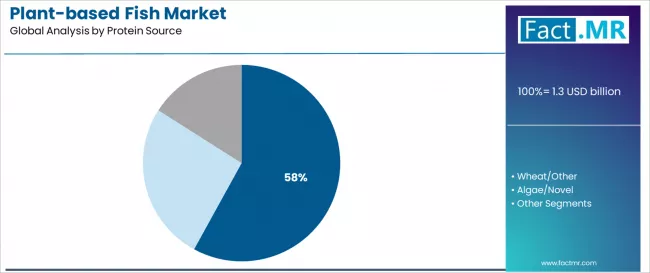
The soy/pea blends protein segment is projected to represent the largest share of plant-based fish demand in 2025 with a 58% market share, underscoring its critical role as the primary protein foundation for plant-based seafood products due to functional properties and nutritional advantages. Manufacturers prefer soy/pea blend proteins for their exceptional binding capabilities, complete amino acid profiles, and proven effectiveness in creating seafood-like textures while maintaining nutritional density and cost effectiveness. Positioned as essential proteins for seafood replication, soy/pea blends offer both functional performance and nutritional completeness advantages.
The segment is supported by continuous innovation in protein processing technology and the growing availability of specialized protein blends that enable superior texture replication with enhanced nutritional profiles and taste characteristics. Alternative protein manufacturers are investing in comprehensive protein optimization programs to support increasingly sophisticated plant-based fish offerings and consumer demand for nutritionally complete seafood alternatives. As plant-based innovation advances and texture requirements increase, the soy/pea blends segment will continue to dominate the market while supporting advanced formulation strategies and sensory optimization.
What are the Drivers, Restraints, and Key Trends of the Plant-based Fish Market?
The plant-based fish market is advancing rapidly due to increasing awareness of ocean sustainability and overfishing concerns driven by environmental consciousness and marine conservation campaigns, alongside growing demand for seafood alternatives that provide familiar taste experiences, nutritional benefits, and culinary versatility while addressing dietary restrictions and sustainability objectives across various consumer demographics and dining applications. The market faces challenges, including complex taste and texture replication requirements, higher costs compared to traditional seafood, and limited consumer familiarity with plant-based seafood concepts. Innovation in sensory replication technology and cost optimization continues to influence product acceptance and market expansion patterns.
Expansion of Ocean Sustainability and Conservation Awareness
The growing awareness of ocean conservation is driving demand for plant-based fish that can address overfishing concerns, reduce marine ecosystem impact, and support sustainable consumption through plant-based alternatives that provide seafood satisfaction without contributing to ocean depletion. Environmentally conscious consumers require advanced plant-based fish formulations that deliver authentic seafood experiences across multiple sensory parameters while supporting marine conservation objectives and sustainable consumption practices. Food companies are increasingly recognizing the competitive advantages of plant-based fish positioning for sustainability markets and environmentally conscious consumer segments, creating opportunities for specialized products designed for ocean conservation and sustainable dining applications.
Integration of Advanced Texture and Taste Replication Technologies
Modern plant-based fish manufacturers are incorporating advanced food technology and sensory replication methods to enhance product authenticity, improve consumer acceptance, and support comprehensive seafood experience delivery through innovative processing techniques, flavor development, and texture optimization systems. Leading companies are developing proprietary texture technologies, implementing natural flavoring systems, and advancing processing methods that maximize seafood replication while maintaining nutritional value and cost competitiveness. These technologies improve product quality while enabling new market opportunities, including premium restaurant applications, specialty retail channels, and discerning consumer segments seeking authentic plant-based seafood experiences.
Development of Novel Protein Sources and Premium Applications
The expansion of alternative protein research and premium food markets is driving demand for innovative plant-based fish products utilizing novel protein sources including algae, fungi, and advanced plant proteins that provide enhanced nutritional profiles and unique sensory characteristics. These premium applications require cutting-edge biotechnology capabilities and specialized processing systems that exceed traditional plant protein production requirements, creating differentiated market segments with enhanced value propositions. Manufacturers are investing in novel protein research and premium product development to serve emerging high-value applications while supporting innovation in sustainable protein technology and luxury food markets.
Analysis of the Plant-based Fish Market by Key Countries
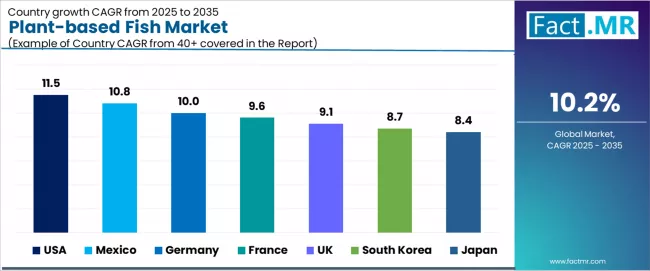
| Country | CAGR (2025-2035) |
|---|---|
| USA | 11.5% |
| Mexico | 10.8% |
| Germany | 10% |
| France | 9.6% |
| UK | 9.1% |
| South Korea | 8.7% |
| Japan | 8.4% |
The plant-based fish market is experiencing exceptional growth globally, with the USA leading at an 11.5% CAGR through 2035, driven by extensive environmental consciousness, advanced alternative protein innovation, and strong consumer interest in sustainable seafood supporting plant-based fish development. Mexico follows at 10.8%, supported by growing environmental awareness, expanding plant-based food culture, and increasing availability of alternative protein products. Germany shows growth at 10%, emphasizing sustainability leadership, environmental consciousness, and advanced food technology applications. France demonstrates 9.6% growth, supported by culinary innovation, sustainability focus, and premium food market development. The UK records 9.1%, focusing on environmental awareness, plant-based lifestyle adoption, and sustainable food innovation. South Korea exhibits 8.7% growth, emphasizing food technology advancement and premium alternative proteins. Japan shows 8.4% growth, supported by seafood culture appreciation and quality alternative food preferences.
USA Leads Global Market Growth with Alternative Protein Innovation
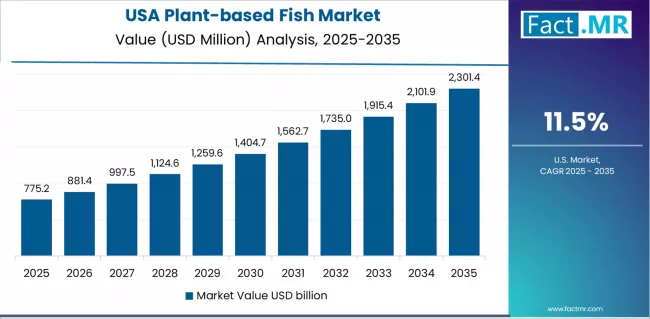
Revenue from plant-based fish in the USA is projected to exhibit exceptional growth with a CAGR of 11.5% through 2035, driven by extensive environmental consciousness development and rapidly growing alternative protein innovation supporting plant-based fish adoption among environmentally aware consumers, flexitarians, and sustainability-focused dining establishments. The country's advanced alternative protein industry infrastructure and increasing consumer interest in ocean conservation are creating substantial demand for plant-based fish solutions. Major alternative protein companies and food manufacturers are establishing comprehensive research and development capabilities to serve both domestic markets and export opportunities.
- Strong environmental consciousness and ocean sustainability awareness are driving demand for plant-based fish throughout health stores, mainstream supermarkets, and progressive restaurants across urban markets, coastal communities, and environmentally conscious consumer segments.
- Growing alternative protein innovation and investment are supporting the rapid development of advanced plant-based fish formulations among companies seeking sustainability advantages and competitive positioning in the expanding alternative protein market.
Mexico Demonstrates Strong Market Potential with Environmental Awareness Growth
Revenue from plant-based fish in Mexico is expanding at a CAGR of 10.8%, supported by the country's growing environmental awareness, expanding plant-based food culture, and increasing consumer interest in sustainable food alternatives and ocean conservation solutions. The country's evolving sustainability consciousness and food innovation trends are driving demand for plant-based fish products throughout urban centers and environmentally focused communities. Leading alternative protein brands and food companies are establishing comprehensive distribution networks to address growing demand for sustainable seafood alternatives.
- Rising environmental awareness and expanding sustainability culture are creating opportunities for plant-based fish adoption across specialty stores, progressive supermarkets, and eco-conscious restaurants in major urban markets and environmental communities.
- Growing plant-based food interest and ocean conservation awareness are driving adoption of plant-based fish products among consumers seeking sustainable dining options and environmental responsibility in food choices.
Germany Demonstrates Sustainability Excellence with Environmental Leadership
Revenue from plant-based fish in Germany is expanding at a CAGR of 10%, driven by the country's sustainability leadership, environmental consciousness, and comprehensive approach to sustainable food systems supporting evidence-based plant-based fish development. Germany's environmental awareness and sustainable consumption focus are driving demand for scientifically validated plant-based fish solutions. Leading sustainability-focused companies and alternative protein manufacturers are establishing comprehensive innovation programs for environmentally responsible food development.
- Advanced sustainability standards and consumer preference for environmentally responsible products are creating demand for plant-based fish products among environmentally conscious consumers seeking ocean conservation and sustainable dining solutions.
- Strong environmental leadership and sustainable food system emphasis are supporting the adoption of certified plant-based fish formulations across organic retailers, sustainability-focused restaurants, and environmental consumer markets throughout major urban regions.
France Focuses on Culinary Innovation and Premium Sustainability
Revenue from plant-based fish in France is expanding at a CAGR of 9.6%, driven by the country's culinary innovation leadership, sustainability focus, and comprehensive approach to premium sustainable food experiences supporting plant-based fish integration into sophisticated dining applications. France's gastronomic excellence and environmental consciousness are supporting investment in premium plant-based fish technologies. Major culinary companies and sustainability-focused brands are establishing comprehensive innovation programs incorporating plant-based fish with French culinary expertise.
- Advanced culinary standards and consumer preference for premium sustainable ingredients are creating demand for high-quality plant-based fish throughout specialty restaurants, gourmet retailers, and premium food applications serving sophisticated consumer segments.
- Strong culinary innovation and sustainability integration are driving the adoption of artisanal plant-based fish applications meeting high culinary standards and environmental responsibility requirements across diverse premium dining experiences.
UK Shows Market Leadership with Sustainability Integration
Revenue from plant-based fish in the UK is expanding at a CAGR of 9.1%, supported by the country's environmental awareness, plant-based lifestyle adoption, and growing interest in sustainable food innovation and ocean conservation supporting plant-based fish adoption across mainstream and premium market segments. The UK's sustainability focus and alternative protein acceptance are driving demand for innovative plant-based fish solutions. Leading sustainability brands and alternative protein companies are investing in product innovation and consumer education for sustainable seafood markets.
- Advanced environmental consciousness and consumer interest in sustainable dining are creating opportunities for plant-based fish products throughout progressive supermarkets, specialty retailers, and sustainable restaurants serving environmentally conscious consumer segments.
- Strong plant-based lifestyle trends and ocean conservation awareness are driving the adoption of plant-based fish formulations across mainstream retail channels, specialty outlets, and foodservice establishments targeting sustainability-focused consumers.
South Korea Demonstrates Technology Leadership with Food Innovation
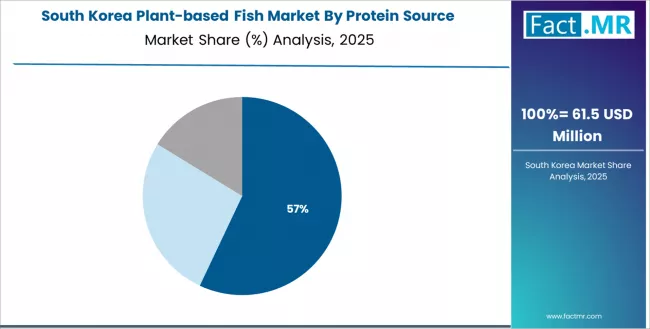
Revenue from plant-based fish in South Korea is expanding at a CAGR of 8.7%, supported by the country's food technology advancement, premium alternative protein market, and strong emphasis on culinary innovation and quality food products supporting sophisticated plant-based fish utilization. The nation's food technology capabilities and innovation culture are driving demand for advanced plant-based fish solutions. Leading food technology companies are investing extensively in premium product development and alternative protein market expansion.
- Advanced food technology capabilities and premium alternative protein demand are creating demand for plant-based fish products throughout specialty food stores, premium restaurants, and innovative food retailers serving quality-conscious consumer segments.
- Strong culinary innovation and food technology focus are supporting the adoption of plant-based fish formulations designed for authentic taste experiences, premium positioning, and culinary excellence across diverse consumer demographics.
Japan Shows Premium Focus with Seafood Culture Integration
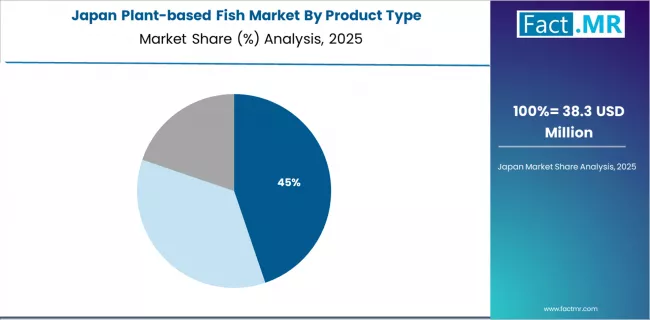
Revenue from plant-based fish in Japan is expanding at a CAGR of 8.4%, supported by the country's established seafood culture, quality food preferences, and strong emphasis on food innovation and sustainability supporting plant-based fish adoption for traditional and modern culinary applications. Japan's culinary expertise and quality consciousness are driving demand for premium plant-based fish products. Leading food companies are investing in specialized capabilities for seafood alternative applications and traditional cuisine integration.
- Advanced seafood culture and quality food focus are creating opportunities for plant-based fish products throughout specialty food retailers, innovative restaurants, and premium food channels serving traditional cuisine enthusiasts and modern food consumers.
- Strong quality standards and culinary excellence emphasis are driving adoption of premium plant-based fish formulations meeting Japanese consumer expectations for authenticity, quality, and comprehensive culinary satisfaction across diverse seafood applications.
Europe Market Split by Country
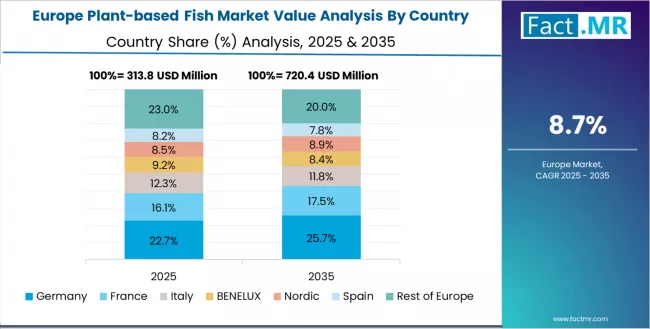
The plant-based fish market in Europe is projected to grow from USD 380 million in 2025 to USD 980 million by 2035, registering a CAGR of 9.9% over the forecast period. Germany is expected to maintain leadership with a 28.9% market share in 2025, moderating to 28.6% by 2035, supported by sustainability leadership, environmental consciousness, and advanced alternative protein development.
France follows with 24.2% in 2025, projected to reach 24.5% by 2035, driven by culinary innovation leadership, sustainability focus, and premium sustainable food market development. The United Kingdom holds 21.8% in 2025, expected to reach 22% by 2035 due to environmental awareness and plant-based lifestyle adoption. Italy commands 13.2% in 2025, rising to 13.3% by 2035, while Spain accounts for 8.7% in 2025, reaching 8.8% by 2035. The Rest of Europe region is anticipated to hold 3.2% in 2025 and 2.8% by 2035, reflecting steady sustainable food adoption in Nordic countries and emerging alternative protein markets in Eastern European countries.
Competitive Landscape of the Plant-based Fish Market
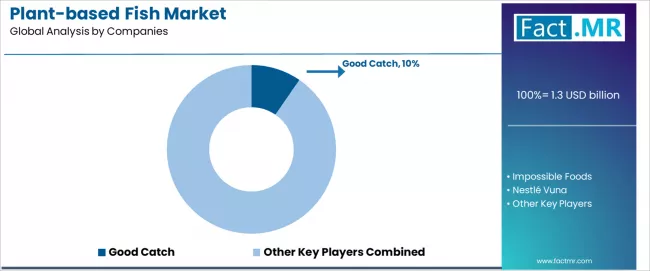
The plant-based fish market is characterized by competition among innovative alternative protein startups, established plant-based companies, and traditional food manufacturers expanding into seafood alternatives. Companies are investing in sensory replication technology development, novel protein source research, production scaling capabilities, and retail partnership expansion to deliver authentic, sustainable, and accessible plant-based fish solutions. Innovation in texture optimization, flavor development, and cost reduction is central to strengthening market position and competitive advantage.
Good Catch leads the market with a 9.6% share, offering comprehensive plant-based seafood solutions with focus on taste authenticity, sustainability messaging, and extensive retail distribution serving environmentally conscious consumers and flexitarian dining preferences. The company continues investing in research and development while expanding product portfolio and foodservice partnerships. Impossible Foods provides breakthrough technology with emphasis on sensory replication and mainstream market penetration. Nestlé Vuna offers global reach with premium positioning and sustainability credentials. Quorn emphasizes established alternative protein expertise with seafood expansion. OmniFoods focuses on Asian market leadership with cultural adaptation. Gardein provides mainstream accessibility with diverse product portfolio.
Key Players in the Plant-based Fish Market
- Good Catch
- Impossible Foods
- Nestlé Vuna
- Quorn
- OmniFoods
- Gardein
- New Wave Foods
- Hooked Foods
- Loma Linda
- The ISH Company
Scope of the Report
| Items | Values |
|---|---|
| Quantitative Units (2025) | USD 1.3 billion |
| Product Type | Fillets & Sticks, Tuna-style Flakes, Shrimp/Crab Analogs |
| Protein Source | Soy/Pea Blends, Wheat/Other, Algae/Novel |
| Distribution Channel | Retail, Foodservice, Online |
| Regions Covered | North America, Europe, Asia-Pacific, Latin America, Middle East & Africa |
| Countries Covered | USA, Mexico, Germany, France, UK, Japan, South Korea, and 40+ countries |
| Key Companies Profiled | Good Catch, Impossible Foods, Nestlé Vuna, Quorn, OmniFoods, Gardein |
| Additional Attributes | Dollar sales by product type and protein source, regional demand trends, competitive landscape, technological advancements in plant-based seafood production, sensory replication innovation, sustainability positioning development, and ocean conservation messaging |
Plant-based Fish Market by Segments
-
Product Type :
- Fillets & Sticks
- Tuna-style Flakes
- Shrimp/Crab Analogs
-
Protein Source :
- Soy/Pea Blends
- Wheat/Other
- Algae/Novel
-
Distribution Channel :
- Retail
- Foodservice
- Online
-
Region :
- North America
- United States
- Canada
- Mexico
- Europe
- Germany
- United Kingdom
- France
- Italy
- Spain
- Netherlands
- Rest of Europe
- Asia-Pacific
- Japan
- South Korea
- China
- India
- Australia
- Rest of Asia-Pacific
- Latin America
- Brazil
- Argentina
- Rest of Latin America
- Middle East & Africa
- Kingdom of Saudi Arabia
- South Africa
- Rest of Middle East & Africa
- North America
Table of Content
- Executive Summary
- Global Market Outlook
- Demand to side Trends
- Supply to side Trends
- Technology Roadmap Analysis
- Analysis and Recommendations
- Market Overview
- Market Coverage / Taxonomy
- Market Definition / Scope / Limitations
- Market Background
- Market Dynamics
- Drivers
- Restraints
- Opportunity
- Trends
- Scenario Forecast
- Demand in Optimistic Scenario
- Demand in Likely Scenario
- Demand in Conservative Scenario
- Opportunity Map Analysis
- Product Life Cycle Analysis
- Supply Chain Analysis
- Investment Feasibility Matrix
- Value Chain Analysis
- PESTLE and Porter’s Analysis
- Regulatory Landscape
- Regional Parent Market Outlook
- Production and Consumption Statistics
- Import and Export Statistics
- Market Dynamics
- Global Market Analysis 2020 to 2024 and Forecast, 2025 to 2035
- Historical Market Size Value (USD Million) Analysis, 2020 to 2024
- Current and Future Market Size Value (USD Million) Projections, 2025 to 2035
- Y to o to Y Growth Trend Analysis
- Absolute $ Opportunity Analysis
- Global Market Pricing Analysis 2020 to 2024 and Forecast 2025 to 2035
- Global Market Analysis 2020 to 2024 and Forecast 2025 to 2035, By Product Type
- Introduction / Key Findings
- Historical Market Size Value (USD Million) Analysis By Product Type , 2020 to 2024
- Current and Future Market Size Value (USD Million) Analysis and Forecast By Product Type , 2025 to 2035
- Fillets & Sticks
- Tuna-style Flakes
- Shrimp/Crab Analogs
- Y to o to Y Growth Trend Analysis By Product Type , 2020 to 2024
- Absolute $ Opportunity Analysis By Product Type , 2025 to 2035
- Global Market Analysis 2020 to 2024 and Forecast 2025 to 2035, By Protein Source
- Introduction / Key Findings
- Historical Market Size Value (USD Million) Analysis By Protein Source, 2020 to 2024
- Current and Future Market Size Value (USD Million) Analysis and Forecast By Protein Source, 2025 to 2035
- Soy/Pea Blends
- Wheat/Other
- Algae/Novel
- Y to o to Y Growth Trend Analysis By Protein Source, 2020 to 2024
- Absolute $ Opportunity Analysis By Protein Source, 2025 to 2035
- Global Market Analysis 2020 to 2024 and Forecast 2025 to 2035, By Region
- Introduction
- Historical Market Size Value (USD Million) Analysis By Region, 2020 to 2024
- Current Market Size Value (USD Million) Analysis and Forecast By Region, 2025 to 2035
- North America
- Latin America
- Western Europe
- Eastern Europe
- East Asia
- South Asia and Pacific
- Middle East & Africa
- Market Attractiveness Analysis By Region
- North America Market Analysis 2020 to 2024 and Forecast 2025 to 2035, By Country
- Historical Market Size Value (USD Million) Trend Analysis By Market Taxonomy, 2020 to 2024
- Market Size Value (USD Million) Forecast By Market Taxonomy, 2025 to 2035
- By Country
- USA
- Canada
- Mexico
- By Product Type
- By Protein Source
- By Country
- Market Attractiveness Analysis
- By Country
- By Product Type
- By Protein Source
- Key Takeaways
- Latin America Market Analysis 2020 to 2024 and Forecast 2025 to 2035, By Country
- Historical Market Size Value (USD Million) Trend Analysis By Market Taxonomy, 2020 to 2024
- Market Size Value (USD Million) Forecast By Market Taxonomy, 2025 to 2035
- By Country
- Brazil
- Chile
- Rest of Latin America
- By Product Type
- By Protein Source
- By Country
- Market Attractiveness Analysis
- By Country
- By Product Type
- By Protein Source
- Key Takeaways
- Western Europe Market Analysis 2020 to 2024 and Forecast 2025 to 2035, By Country
- Historical Market Size Value (USD Million) Trend Analysis By Market Taxonomy, 2020 to 2024
- Market Size Value (USD Million) Forecast By Market Taxonomy, 2025 to 2035
- By Country
- Germany
- UK
- Italy
- Spain
- France
- Nordic
- BENELUX
- Rest of Western Europe
- By Product Type
- By Protein Source
- By Country
- Market Attractiveness Analysis
- By Country
- By Product Type
- By Protein Source
- Key Takeaways
- Eastern Europe Market Analysis 2020 to 2024 and Forecast 2025 to 2035, By Country
- Historical Market Size Value (USD Million) Trend Analysis By Market Taxonomy, 2020 to 2024
- Market Size Value (USD Million) Forecast By Market Taxonomy, 2025 to 2035
- By Country
- Russia
- Poland
- Hungary
- Balkan & Baltic
- Rest of Eastern Europe
- By Product Type
- By Protein Source
- By Country
- Market Attractiveness Analysis
- By Country
- By Product Type
- By Protein Source
- Key Takeaways
- East Asia Market Analysis 2020 to 2024 and Forecast 2025 to 2035, By Country
- Historical Market Size Value (USD Million) Trend Analysis By Market Taxonomy, 2020 to 2024
- Market Size Value (USD Million) Forecast By Market Taxonomy, 2025 to 2035
- By Country
- China
- Japan
- South Korea
- By Product Type
- By Protein Source
- By Country
- Market Attractiveness Analysis
- By Country
- By Product Type
- By Protein Source
- Key Takeaways
- South Asia and Pacific Market Analysis 2020 to 2024 and Forecast 2025 to 2035, By Country
- Historical Market Size Value (USD Million) Trend Analysis By Market Taxonomy, 2020 to 2024
- Market Size Value (USD Million) Forecast By Market Taxonomy, 2025 to 2035
- By Country
- India
- ASEAN
- Australia & New Zealand
- Rest of South Asia and Pacific
- By Product Type
- By Protein Source
- By Country
- Market Attractiveness Analysis
- By Country
- By Product Type
- By Protein Source
- Key Takeaways
- Middle East & Africa Market Analysis 2020 to 2024 and Forecast 2025 to 2035, By Country
- Historical Market Size Value (USD Million) Trend Analysis By Market Taxonomy, 2020 to 2024
- Market Size Value (USD Million) Forecast By Market Taxonomy, 2025 to 2035
- By Country
- Kingdom of Saudi Arabia
- Other GCC Countries
- Turkiye
- South Africa
- Other African Union
- Rest of Middle East & Africa
- By Product Type
- By Protein Source
- By Country
- Market Attractiveness Analysis
- By Country
- By Product Type
- By Protein Source
- Key Takeaways
- Key Countries Market Analysis
- USA
- Pricing Analysis
- Market Share Analysis, 2024
- By Product Type
- By Protein Source
- Canada
- Pricing Analysis
- Market Share Analysis, 2024
- By Product Type
- By Protein Source
- Mexico
- Pricing Analysis
- Market Share Analysis, 2024
- By Product Type
- By Protein Source
- Brazil
- Pricing Analysis
- Market Share Analysis, 2024
- By Product Type
- By Protein Source
- Chile
- Pricing Analysis
- Market Share Analysis, 2024
- By Product Type
- By Protein Source
- Germany
- Pricing Analysis
- Market Share Analysis, 2024
- By Product Type
- By Protein Source
- UK
- Pricing Analysis
- Market Share Analysis, 2024
- By Product Type
- By Protein Source
- Italy
- Pricing Analysis
- Market Share Analysis, 2024
- By Product Type
- By Protein Source
- Spain
- Pricing Analysis
- Market Share Analysis, 2024
- By Product Type
- By Protein Source
- France
- Pricing Analysis
- Market Share Analysis, 2024
- By Product Type
- By Protein Source
- India
- Pricing Analysis
- Market Share Analysis, 2024
- By Product Type
- By Protein Source
- ASEAN
- Pricing Analysis
- Market Share Analysis, 2024
- By Product Type
- By Protein Source
- Australia & New Zealand
- Pricing Analysis
- Market Share Analysis, 2024
- By Product Type
- By Protein Source
- China
- Pricing Analysis
- Market Share Analysis, 2024
- By Product Type
- By Protein Source
- Japan
- Pricing Analysis
- Market Share Analysis, 2024
- By Product Type
- By Protein Source
- South Korea
- Pricing Analysis
- Market Share Analysis, 2024
- By Product Type
- By Protein Source
- Russia
- Pricing Analysis
- Market Share Analysis, 2024
- By Product Type
- By Protein Source
- Poland
- Pricing Analysis
- Market Share Analysis, 2024
- By Product Type
- By Protein Source
- Hungary
- Pricing Analysis
- Market Share Analysis, 2024
- By Product Type
- By Protein Source
- Kingdom of Saudi Arabia
- Pricing Analysis
- Market Share Analysis, 2024
- By Product Type
- By Protein Source
- Turkiye
- Pricing Analysis
- Market Share Analysis, 2024
- By Product Type
- By Protein Source
- South Africa
- Pricing Analysis
- Market Share Analysis, 2024
- By Product Type
- By Protein Source
- USA
- Market Structure Analysis
- Competition Dashboard
- Competition Benchmarking
- Market Share Analysis of Top Players
- By Regional
- By Product Type
- By Protein Source
- Competition Analysis
- Competition Deep Dive
- Good Catch
- Overview
- Product Portfolio
- Profitability by Market Segments (Product/Age /Sales Channel/Region)
- Sales Footprint
- Strategy Overview
- Marketing Strategy
- Product Strategy
- Channel Strategy
- Impossible Foods
- Nestlé Vuna
- Quorn
- OmniFoods
- Gardein
- New Wave Foods
- Hooked Foods
- Loma Linda
- The ISH Company
- Good Catch
- Competition Deep Dive
- Assumptions & Acronyms Used
- Research Methodology
List Of Table
- Table 1: Global Market Value (USD Million) Forecast by Region, 2020 to 2035
- Table 2: Global Market Value (USD Million) Forecast by Product Type , 2020 to 2035
- Table 3: Global Market Value (USD Million) Forecast by Protein Source, 2020 to 2035
- Table 4: North America Market Value (USD Million) Forecast by Country, 2020 to 2035
- Table 5: North America Market Value (USD Million) Forecast by Product Type , 2020 to 2035
- Table 6: North America Market Value (USD Million) Forecast by Protein Source, 2020 to 2035
- Table 7: Latin America Market Value (USD Million) Forecast by Country, 2020 to 2035
- Table 8: Latin America Market Value (USD Million) Forecast by Product Type , 2020 to 2035
- Table 9: Latin America Market Value (USD Million) Forecast by Protein Source, 2020 to 2035
- Table 10: Western Europe Market Value (USD Million) Forecast by Country, 2020 to 2035
- Table 11: Western Europe Market Value (USD Million) Forecast by Product Type , 2020 to 2035
- Table 12: Western Europe Market Value (USD Million) Forecast by Protein Source, 2020 to 2035
- Table 13: Eastern Europe Market Value (USD Million) Forecast by Country, 2020 to 2035
- Table 14: Eastern Europe Market Value (USD Million) Forecast by Product Type , 2020 to 2035
- Table 15: Eastern Europe Market Value (USD Million) Forecast by Protein Source, 2020 to 2035
- Table 16: East Asia Market Value (USD Million) Forecast by Country, 2020 to 2035
- Table 17: East Asia Market Value (USD Million) Forecast by Product Type , 2020 to 2035
- Table 18: East Asia Market Value (USD Million) Forecast by Protein Source, 2020 to 2035
- Table 19: South Asia and Pacific Market Value (USD Million) Forecast by Country, 2020 to 2035
- Table 20: South Asia and Pacific Market Value (USD Million) Forecast by Product Type , 2020 to 2035
- Table 21: South Asia and Pacific Market Value (USD Million) Forecast by Protein Source, 2020 to 2035
- Table 22: Middle East & Africa Market Value (USD Million) Forecast by Country, 2020 to 2035
- Table 23: Middle East & Africa Market Value (USD Million) Forecast by Product Type , 2020 to 2035
- Table 24: Middle East & Africa Market Value (USD Million) Forecast by Protein Source, 2020 to 2035
List Of Figures
- Figure 1: Global Market Pricing Analysis
- Figure 2: Global Market Value (USD Million) Forecast 2020-2035
- Figure 3: Global Market Value Share and BPS Analysis by Product Type , 2025 and 2035
- Figure 4: Global Market Y to o to Y Growth Comparison by Product Type , 2025-2035
- Figure 5: Global Market Attractiveness Analysis by Product Type
- Figure 6: Global Market Value Share and BPS Analysis by Protein Source, 2025 and 2035
- Figure 7: Global Market Y to o to Y Growth Comparison by Protein Source, 2025-2035
- Figure 8: Global Market Attractiveness Analysis by Protein Source
- Figure 9: Global Market Value (USD Million) Share and BPS Analysis by Region, 2025 and 2035
- Figure 10: Global Market Y to o to Y Growth Comparison by Region, 2025-2035
- Figure 11: Global Market Attractiveness Analysis by Region
- Figure 12: North America Market Incremental Dollar Opportunity, 2025-2035
- Figure 13: Latin America Market Incremental Dollar Opportunity, 2025-2035
- Figure 14: Western Europe Market Incremental Dollar Opportunity, 2025-2035
- Figure 15: Eastern Europe Market Incremental Dollar Opportunity, 2025-2035
- Figure 16: East Asia Market Incremental Dollar Opportunity, 2025-2035
- Figure 17: South Asia and Pacific Market Incremental Dollar Opportunity, 2025-2035
- Figure 18: Middle East & Africa Market Incremental Dollar Opportunity, 2025-2035
- Figure 19: North America Market Value Share and BPS Analysis by Country, 2025 and 2035
- Figure 20: North America Market Value Share and BPS Analysis by Product Type , 2025 and 2035
- Figure 21: North America Market Y to o to Y Growth Comparison by Product Type , 2025-2035
- Figure 22: North America Market Attractiveness Analysis by Product Type
- Figure 23: North America Market Value Share and BPS Analysis by Protein Source, 2025 and 2035
- Figure 24: North America Market Y to o to Y Growth Comparison by Protein Source, 2025-2035
- Figure 25: North America Market Attractiveness Analysis by Protein Source
- Figure 26: Latin America Market Value Share and BPS Analysis by Country, 2025 and 2035
- Figure 27: Latin America Market Value Share and BPS Analysis by Product Type , 2025 and 2035
- Figure 28: Latin America Market Y to o to Y Growth Comparison by Product Type , 2025-2035
- Figure 29: Latin America Market Attractiveness Analysis by Product Type
- Figure 30: Latin America Market Value Share and BPS Analysis by Protein Source, 2025 and 2035
- Figure 31: Latin America Market Y to o to Y Growth Comparison by Protein Source, 2025-2035
- Figure 32: Latin America Market Attractiveness Analysis by Protein Source
- Figure 33: Western Europe Market Value Share and BPS Analysis by Country, 2025 and 2035
- Figure 34: Western Europe Market Value Share and BPS Analysis by Product Type , 2025 and 2035
- Figure 35: Western Europe Market Y to o to Y Growth Comparison by Product Type , 2025-2035
- Figure 36: Western Europe Market Attractiveness Analysis by Product Type
- Figure 37: Western Europe Market Value Share and BPS Analysis by Protein Source, 2025 and 2035
- Figure 38: Western Europe Market Y to o to Y Growth Comparison by Protein Source, 2025-2035
- Figure 39: Western Europe Market Attractiveness Analysis by Protein Source
- Figure 40: Eastern Europe Market Value Share and BPS Analysis by Country, 2025 and 2035
- Figure 41: Eastern Europe Market Value Share and BPS Analysis by Product Type , 2025 and 2035
- Figure 42: Eastern Europe Market Y to o to Y Growth Comparison by Product Type , 2025-2035
- Figure 43: Eastern Europe Market Attractiveness Analysis by Product Type
- Figure 44: Eastern Europe Market Value Share and BPS Analysis by Protein Source, 2025 and 2035
- Figure 45: Eastern Europe Market Y to o to Y Growth Comparison by Protein Source, 2025-2035
- Figure 46: Eastern Europe Market Attractiveness Analysis by Protein Source
- Figure 47: East Asia Market Value Share and BPS Analysis by Country, 2025 and 2035
- Figure 48: East Asia Market Value Share and BPS Analysis by Product Type , 2025 and 2035
- Figure 49: East Asia Market Y to o to Y Growth Comparison by Product Type , 2025-2035
- Figure 50: East Asia Market Attractiveness Analysis by Product Type
- Figure 51: East Asia Market Value Share and BPS Analysis by Protein Source, 2025 and 2035
- Figure 52: East Asia Market Y to o to Y Growth Comparison by Protein Source, 2025-2035
- Figure 53: East Asia Market Attractiveness Analysis by Protein Source
- Figure 54: South Asia and Pacific Market Value Share and BPS Analysis by Country, 2025 and 2035
- Figure 55: South Asia and Pacific Market Value Share and BPS Analysis by Product Type , 2025 and 2035
- Figure 56: South Asia and Pacific Market Y to o to Y Growth Comparison by Product Type , 2025-2035
- Figure 57: South Asia and Pacific Market Attractiveness Analysis by Product Type
- Figure 58: South Asia and Pacific Market Value Share and BPS Analysis by Protein Source, 2025 and 2035
- Figure 59: South Asia and Pacific Market Y to o to Y Growth Comparison by Protein Source, 2025-2035
- Figure 60: South Asia and Pacific Market Attractiveness Analysis by Protein Source
- Figure 61: Middle East & Africa Market Value Share and BPS Analysis by Country, 2025 and 2035
- Figure 62: Middle East & Africa Market Value Share and BPS Analysis by Product Type , 2025 and 2035
- Figure 63: Middle East & Africa Market Y to o to Y Growth Comparison by Product Type , 2025-2035
- Figure 64: Middle East & Africa Market Attractiveness Analysis by Product Type
- Figure 65: Middle East & Africa Market Value Share and BPS Analysis by Protein Source, 2025 and 2035
- Figure 66: Middle East & Africa Market Y to o to Y Growth Comparison by Protein Source, 2025-2035
- Figure 67: Middle East & Africa Market Attractiveness Analysis by Protein Source
- Figure 68: Global Market - Tier Structure Analysis
- Figure 69: Global Market - Company Share Analysis
- FAQs -
How big is the plant-based fish market in 2025?
The global plant-based fish market is estimated to be valued at USD 1.3 billion in 2025.
What will be the size of plant-based fish market in 2035?
The market size for the plant-based fish market is projected to reach USD 3.4 billion by 2035.
How much will be the plant-based fish market growth between 2025 and 2035?
The plant-based fish market is expected to grow at a 10.2% CAGR between 2025 and 2035.
What are the key product types in the plant-based fish market?
The key product types in plant-based fish market are fillets & sticks, tuna-style flakes and shrimp/crab analogs.
Which protein source segment to contribute significant share in the plant-based fish market in 2025?
In terms of protein source, soy/pea blends segment to command 58.0% share in the plant-based fish market in 2025.